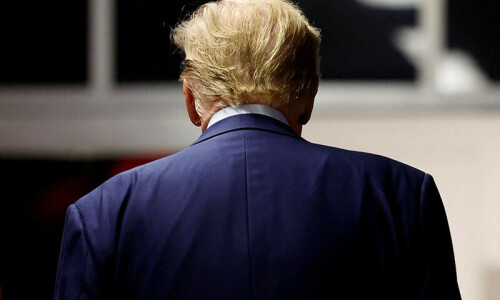WASHINGTON, April 8: The Indian government and its agents have committed arbitrary or unlawful killings, including extrajudicial killings, in Jammu and Kashmir, says a US State Department report released on Friday. According to the department's 2010 human rights reports, as many as 1,616 extrajudicial or unlawful killings were committed in India up to Oct 17 last year. Indian security forces killed demonstrators during the year, including during the protests that occurred between June and September in occupied Jammu and Kashmir. On Sept 13, four persons were killed in Kashmir when police fired on a Muslim group protesting the desecration of the Holy Quran in the West.
On Sept 7, Indian Defence Minister A.K. Antony ordered a new inquiry into the death of Capt Sumit Kohli. The army claimed Mr Kohli committed suicide while serving in Lolab Valley in Jammu and Kashmir in 2006, but family members claimed he had been killed because he had found out about an extrajudicial killing of four railway porters staged by his senior officers.The Public Safety Act, which applies only in Jammu and Kashmir, permits state authorities to detain persons without charge or judicial review for as long as two years. During this time family members do not have access to detainees, and detainees do not have access to legal counsel.
On Feb 24, the Jammu and Kashmir governor stated that 728 persons had been detained under the PSA during 2008-10. On Dec 29, a Kashmir newspaper reported more than 3,500 youths were arrested and 120 persons detained under the PSA during the June to September protests in the Kashmir valley.
Another law enacted in Jammu and Kashmir authorised the government to declare any state or union territory a “disturbed area,” a declaration that allows security forces to fire on any person to “maintain law and order” and to arrest any person “against whom reasonable suspicion exists” without informing the detainee of the grounds for arrest.
The law also gives security forces immunity from prosecution for their actions.
According to a study by the South Asia Forum for Human Rights and the Centre for Law and Development, thousands of habeas corpus cases were pending in the courts throughout the Kashmir valley. NGOs reported that the Jammu and Kashmir government held political prisoners and also temporarily detained hundreds of persons characterised as terrorists, insurgents or separatists.
Human rights activists based in Jammu and Kashmir estimated there were 150 political prisoners in detention, and on Dec 23, members of the central government in Jammu and Kashmir announced that 2,950 political detainees who were arrested during the June-September protests had been released while 50 remained in prison.
Prisoners arrested under one of the special anti-terrorism laws often were not formally charged, nor did their family or other visitors have access to them. In September the state government reinstated four police officials allegedly involved in the May 2009 killing of Neelofar Jan and Asiya Jan in the Shopian district. Relatives and police discovered the bodies of Neelofar and Asiya in a stream and local residents and examining doctors alleged that Indian security forces' personnel had gang-raped and killed them.
In addition, several government officials stated that police involvement in the killings could not be ruled out. In July 2009 the high court ordered the arrest of the four police officers on charges of suppressing and destroying evidence in the case.
In December 2009 the Central Bureau of Investigation submitted its report to the high court, concluding the women had died of drowning and ruling out foul play. The report prompted renewed protests and a general strike in the state.
















































Dear visitor, the comments section is undergoing an overhaul and will return soon.